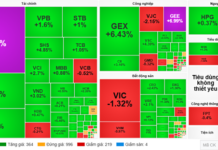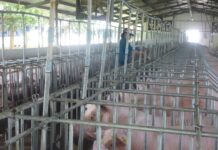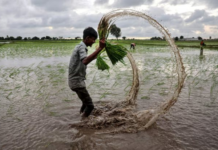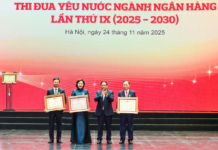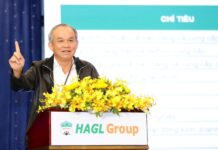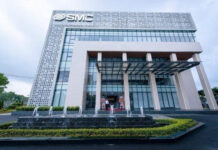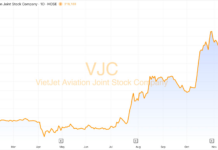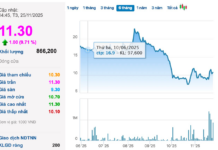To better understand the global economic segmentation situation as well as the solutions to effectively exploit Vietnam’s new growth drivers, TTXVN reporter conducted an exchange with economic expert – Mr. Nguyen Bich Lam, former Director General of the General Statistics Office, on this matter.
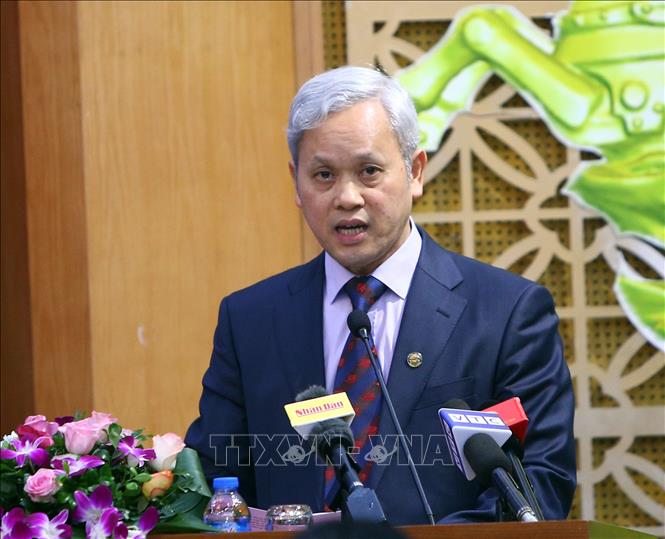
Economic expert – Mr. Nguyen Bich Lam, former Director General of the General Statistics Office. Photo: Danh Lam/TTXVN
Sir, how does the world’s economic segmentation affect and what role does Vietnam play in the global economic segmentation situation?
When the world economy is divided into blocks, it affects trade and international capital flow. Global trade has slowed down, especially trade between politically dissimilar blocks. Intra-block trade growth has declined by 0.5 percentage points to 1.7%; while trade growth between blocks has decreased from 3% before the Russia-Ukraine conflict to about -1.9%; intra-block trade growth is more than 3.8% higher than trade between blocks.
The international flow of capital of multinational corporations is shifting in three directions: returning to their home country; moving closer to their home country; moving to friendly countries. The trade flow and international capital flow model in the segmented world economy will bring benefits to countries in terms of minimizing supply chain disruption and enhancing national security. However, if not well managed and operated, this model can cause more harm than the benefits it brings.
In the context of segmentation, Vietnam plays a “connecting” role in international trade and investment between blocks. Vietnam is benefiting from the change in the trade model and foreign investors are looking to increase investment in Vietnam.
In 2024 and the following years, it is forecasted that FDI inflows will increase in Vietnam. Therefore, the Government needs to urgently determine the specific list of sectors and fields that need to attract foreign investment and the sectors and fields that only domestic investors can implement…
In addition, the Government needs to establish regulations and standards as a new filter to select foreign investors with advanced technology, environmental friendliness, and real capacity; at the same time, issue regulations to protect the reputation and effectiveness of serious investors who always comply with Vietnamese laws and international practices.
Especially, Vietnam needs to be cautious in selecting FDI projects, not allowing some countries to transfer part of their production activities to Vietnam in order to take advantage of the FTAs that Vietnam has signed, turning Vietnam into a “buffer area”, performing assembly and then exporting products.
Along with that, the Government needs to improve the investment environment, reform administrative procedures as an urgent task to attract and absorb high-quality investment capital; strictly and effectively implement intellectual property protection; urgently improve the quality of the labor force; especially, there should be special policies to support domestic enterprises with enough capacity and conditions to participate in the value chain of high-tech and high-value foreign conglomerates, eliminating the situation where Vietnamese enterprises only perform simple labor-intensive tasks.
In a world of economic segmentation, how can Vietnam protect its commercial interests and minimize the losses caused by the segmentation situation, according to you?
In recent years, Vietnam’s sustainable export growth has become an important driving force contributing to and promoting economic growth. The scale of Vietnam’s international trade is growing, surpassing the milestone of $730 billion for the first time in 2022; the export competitiveness is increasingly consolidated, many Vietnamese export items have an important position in the world’s export rankings.
However, at present, the international import market imposes stricter regulations and standards on exported goods of countries. In Europe, one of Vietnam’s key export markets, regarding the “European Green Deal”, there is a package of actions to reduce greenhouse gas emissions and minimize resource use.
From there, many new regulations have been introduced for goods that want to be exported to this market, such as: EU forest protection regulations applied from December 30, 2024, will affect Vietnam’s agricultural exports; The EU aims to eliminate the “consume and dispose” culture, eliminate products with a “short life cycle”, and an “economy of waste”. These regulations will directly affect Vietnam’s textile and garment exports to the EU; Carbon adjustment mechanism will impose carbon taxes on imported goods into the EU.
The segmented world economy, for the sake of national interests and security, is adjusting economic policies and legal environment for production and business. The Government needs to monitor and understand the changes in international regulations, urgently revise and supplement regulations to create favorable conditions for domestic production and business activities. Amendments, supplements and improvements to the legal system are very important, creating a foundation to maximize the effectiveness of other growth drivers.
In the context of a segmented world economy, what do you think Vietnam needs to do in terms of institutional environment and economic policies to maximize the effectiveness of growth drivers?
In recent decades, Vietnam’s economic growth drivers have included four groups: reforming, supplementing and improving the institutional environment; promoting investment, especially public investment in infrastructure construction, raising the competitiveness of the economy; exporting goods and services; promoting domestic consumer demand.
The segmented world economy will directly impact the four groups of drivers to varying degrees. However, in the face of shortcomings in the legal environment, contradictory policies, many barriers to business conditions; cross-ownership and vested interests reduce the effectiveness of credit and interest rate policies, causing macro instability; slow and ineffective policy enforcement; a part of officials and civil servants avoid responsibility, push work away, the Government needs to direct ministries, agencies and localities to urgently assess existing drawbacks, challenges that impede the growth drivers, and promptly propose solutions to remove them in order to maximize the strength and effectiveness of each growth driver.
Together with that, the Government needs to urgently improve the system that provides competitive input factors for production, reducing costs; promote digital transformation, increase the level of innovation in production and business, enhance the quality of human resources and the competitiveness of domestically made products.
The segmented world economy, for national interests and security, is adjusting economic policies and legal environment for production and business. The Government needs to monitor and understand the changes in the international market, promptly revise, and supplement the legal system, create favorable conditions for production and business activities. Amending, supplementing, and improving the legal system have a very important role, creating a foundation to maximize the effectiveness of other growth drivers.
Sir, why does Vietnam play a “connecting” role in the segmented world economy?
With an independent, self-reliant, diversified, multilateral foreign policy, not choosing sides but choosing justice and righteousness, being a reliable partner, a responsible member of the international community; with a flexible and appropriate diplomatic policy, Vietnam has strategic partnerships with the US and Japan, emphasizing cooperation in trade, investment, and science and technology which are important prerequisites for economic development, especially for foreign investment in our high-tech and export sectors.
Vietnam’s position has elevated the country’s economy to play a role in connecting economies between blocks in the segmented world. This is an opportunity that not every country can have. We need to maximize the role of an economy that connects in the segmented world to promote and maximize the effectiveness of growth drivers, helping the economy overcome the middle-income trap and become a developed industrialized country with high income in the next few decades.
To turn opportunities into reality, create new impetus for fast and sustainable growth, what does Vietnam need to do, sir?
First of all, we need to act urgently with a breakthrough mindset, with a long-term vision, and always nurture and implement the aspiration for a powerful Vietnam that puts the interests of the country and the people above all else; unify the line of thinking and direction; revise, supplement, and improve institutions, management mechanisms to exploit intellectual potential and use of talents.
Innovate thinking, improve the efficiency of leadership and management, and economic governance capacity. The decisive factor for success in the country’s development process is the correct awareness, timely seizing opportunities, taking urgent action to turn opportunities into actual development.
Together with that, the Government is always ready to perform the tasks of being the “Midwife, nurturer, and reliable companion” for industries, sectors, and key economic groups in necessary stages and periods; at the same time, it needs to determine which industries and sectors will become new growth drivers, thereby having breakthrough mechanisms and solutions regarding capital, finance, and high-quality human resources to invest and deploy new drivers.
Thank you, sir!

